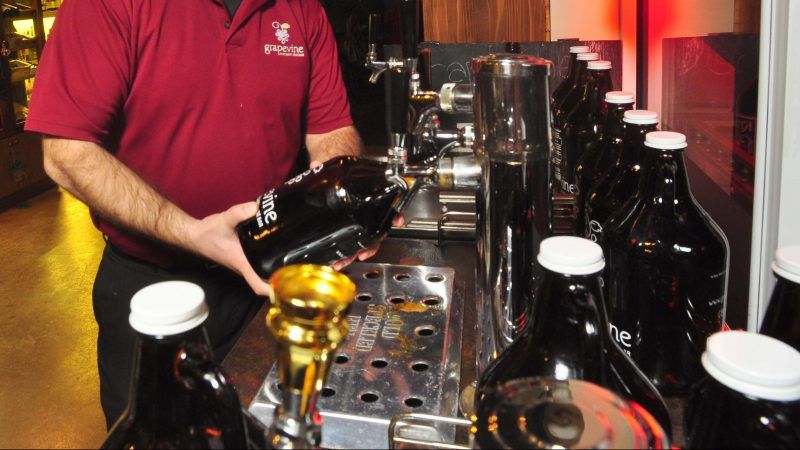Dumb Minnesota Beer Law Punishes Successful Breweries
Castle Danger Brewing is the latest of the state's craft breweries to be victimized by a law that forbids all but the smallest operations from selling growlers on location.

A Minnesota law that punishes breweries for being too successful is about to strike another blow.
This time it's going to hit Castle Danger Brewing—probably the coolest name of any brewery in the state—which has, in little more than a decade, gone from being a homebrewing operation to being crowned the best brewery in the state two years running in polls of Minneapolis Star Tribune readers. That accomplishment is even more impressive considering that Castle Danger is located in a small town on the shores of Lake Superior, more than two hours outside the Twin Cities.
But that sort of statewide fame comes with an obvious downside in Minnesota. Breweries that produce more than 20,000 gallons of beer annually are prohibited from selling growlers—typically 64-ounce, refillable containers for transporting beer—from their own taprooms. Aside from growlers, all breweries in Minnesota are forbidden from selling beer to-go. Castle Danger Brewing will hit the 20,000-gallon threshold and will stop selling growlers on October 1, the brewery announced on Facebook.
Maddy Stewart, marketing and events manager for the brewery, told the Duluth News Tribune that the brewery will have to make "some pretty tough decisions" due to the expected financial loss. Growlers make up about 30 percent of the brewery's taproom sales. According to the Minnesota Craft Brewers Guild, some breweries have lost as much as $300,000 in revenue after hitting the no-growlers threshold.
Being prohibited from selling growlers is also a bit of a personal blow to Castle Danger Brewing. Back in 2011, when the brewery first opened, the only way to get Castle Danger beer was to show up at the brewery on one of the three nights per week when growlers were on sale. There wasn't even a taproom yet, just a single tap for filling the large to-go bottles.
Why should a successful brewery be banned from selling beer in certain containers? It's all about the political power of beer distributors and liquor stores. Once a brewery hits the 20,000-gallon threshold, the only way to get its beer to the public (aside from what might be served in glasses at the brewery's taphouse) is to contract with a distributor.
Earlier this year, some state lawmakers attempted to change the law to allow breweries to sell growlers if they produce less than 40,000 gallons of beer annually. That proposal was sunk by defenders of the so-called "three-tiered system" of alcohol producers, distributors, and retailers.
Like similar systems in many other states, the three-tiered model is a holdover from the days immediately following prohibition. These days, it mostly serves as state-sanctioned protectionism for distributors and retailers, who can use their influence in state government to set artificial and arbitrary rules on producers—in this case, breweries.
And Minnesota's growler sales cap is the definition of arbitrary. There's no public health justification for saying that it's OK for a brewery to sell 64-ounce bottles of beer to the public as long as the brewery makes 19,999 gallons of beer each year, but that a brewery producing 20,001 gallons of beer shouldn't be allowed to do the same.
In practice, the rule is a way to guarantee distributors get a piece of the action, but it also unfairly punishes breweries for doing nothing more than increasing production to meet the demand for their products. By limiting the growth of small breweries, the law hands an advantage to larger operations that don't rely on growler sales at all. And unions like the Teamsters oppose lifting the cap because mandating that breweries sell their beer through distributors helps guarantee Teamster jobs, the Minnesota Post reported during the legislative fight earlier this year.
Castle Danger is hardly the only brewery to hit the no-growlers threshold. Other Minnesota-based craft breweries like Fulton, Schell, Summit, and Surly have already busted through the 20,000-gallon limit and continued growing. Bent Paddle Brewing and Lift Bridge Brewing Company are quickly approaching the same limit.
It's clear that successful breweries can survive the loss of growler sales, but that doesn't make Minnesota's law any less nonsensical.


Show Comments (20)